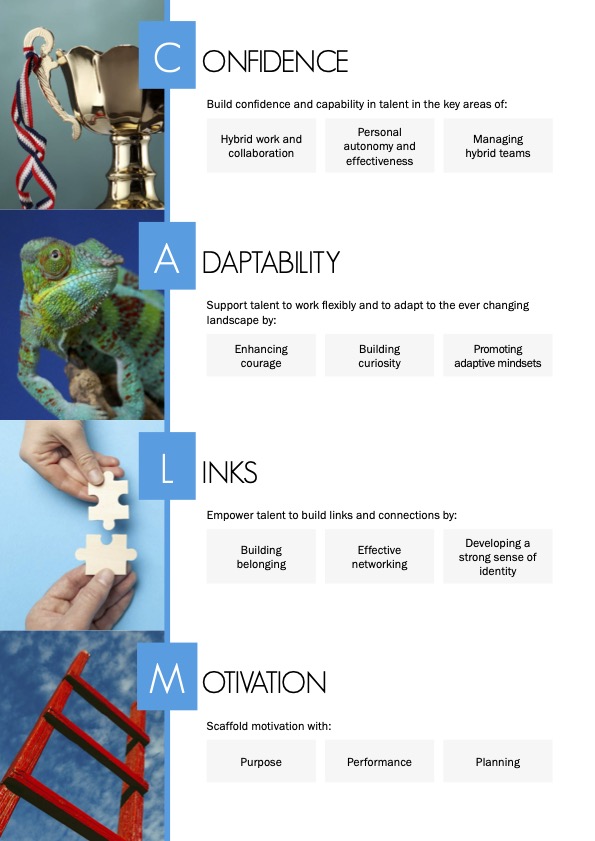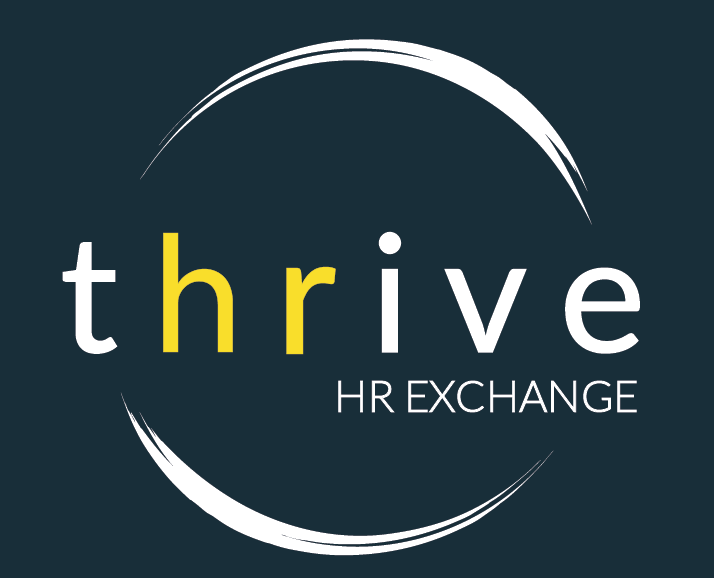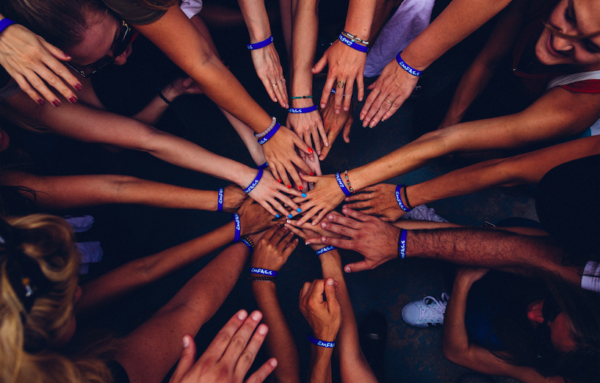Keep CALM and Build Well-Being
In partnership with Thrive HR Exchange and Development Beyond Learning (DBL)
As well-being continues to be a focus for companies as countries start to evolve through the continued implications of the COVID-19 pandemic, Development Beyond Learning has been focussing on bespoke research to assist companies with their evolutions in this space.
We were lucky enough to partner with Thrive HR Exchange and DBL to showcase the research that has informed DBL’s CALM model. Chief Behavioural Office, Alice Hooper-Scott shared the research with us on our latest ChapmanCG HR Leaders Exchange.
This research was undertaken across Europe, South East Asia and Australia between August 2020 and May 2021.
There were some interesting takeaways including
- General well-being for employees is lower than for the business leaders
- 29% of employees feel satisfied with their lives today vs 47% of employers
- The data showed that business leaders perceived a higher employee well-being level suggesting that there is a perception gap as well as a lived experience gap
- 33.7% of respondents in the 18–24-year-old group feel discouraged or concerned about 2021
- There are greater feelings of loneliness and more have reported suicidal thoughts or deliberately hurting themselves
- They feel less able to cope with the stress of the pandemic and are more worried about the future.
- These new starters have a slightly greater need for emotional support (34%) vs existing employees (31%), and a much greater need for support in building relationships (32% vs 18%) and assistance working in a remote / hybrid context (32% vs 19%).
- The feeling of “Imposter syndrome” is reflected in both men and women.
- Whilst general well-being is viewed at 47% and 60% for female and male employees respectively, perceived performance ratings revealed 32% of men rated their own performance as better during the pandemic, versus only 18% of women.
You can download your copy of the white paper with additional insights from this research direct from DBL here.
These research findings led DBL to commission an extensive literature review and meta-analysis, which informed the recommendations put forward in the CALM Model.
Whilst almost all the employers surveyed by DBL have looked to implement tactics to support their people’s well-being, the research confirms that extra care will be needed to mitigate certain ‘wellness gaps’ in the hybrid future of work.

There is an opportunity for employers to inspire lasting behaviour change, in order to generate an enduring impact for employee well-being. To shift the dial towards long-term improvement in well-being, principles from behavioural science and psychology can be leveraged to empower business leaders and employees to promote and sustain their own and others’ well-being. CALM is an acronym to help you to remember – as senior leaders responsible for others’ well-being, and as individuals looking after your own well-being – the four key actions you can take to support well-being.
Having delved into the CALM model, the ensuing discussion amongst the HR leaders present raised the following points:
White-collar vs Blue-collar workers – should we be viewing their well-being support differently?
- Whilst the survey didn’t focus on this area specifically the research undertaken by DBL suggests that the pandemic has affected workers in varying ways and there is enormous socioeconomic and racial inequality between those who are able to work from home and those who are not.
- Some employees have to go to their place of work, no matter what the situation, particularly in the manufacturing sector. The challenge for HR leaders is now how to navigate the future of work so that everyone’s well-being is considered and tailored for. Companies will have greater talent retention if future work formats are constructed consistently, fairly and showing similar values and thoughts for the inclusion of all employees.
- Business leaders seem to have a higher level of well-being. They have a greater autonomy and choice which then allows them to control other areas of their life to enhance their well-being. Whereas more junior workers, and workers lower down the socioeconomic scale, do not enjoy the same levels of autonomy or resource. Ensuring a participative process where they feel involved in, even if the final outcome isn’t exactly as they would have liked, will lead to a more positive long-term effect on inclusion
How can the CALM model assist with encouraging return to work?
- Removing the uncertainty that employees may feel about returning to work, by making some decisions on how things will work in the future will allow employees to have some control of their situation. This can be a simple company action such as advising employees that any future processes on returning to work will be provided with 3 months notice. This for example will mean that parents needing to amend their childcare processes have time to do so which gives back their ability to control their everyday lives and influences their well-being.
- Providing employees with an ability to focus on what is in their control is another way to also influence their well-being.
- Crucial to the success of any changes and process will be the managers, who will need to be empowered by business leaders. This will allow them to create individual and personal solutions that work for their teams whilst keeping the larger company agenda in mind and the employees will feel psychologically safe to share their perspectives.
During the pandemic, significant time and energy were invested to build a sense of belonging virtually – how do we retain this as things evolve to a return to the office?
- Businesses are acknowledging that one size does not fit for everyone. As the pandemic hit, the control was taken away from both the employers and the employees. Now things are a little different.
- Asking employees what they want is key to get their buy-in and engagement, otherwise they will go elsewhere.
- Managers should be given the power to work on a solution that works best for their teams. For example, any larger physical group events should be for everyone rather than the majority who can attend in person to ensure a true sense of team belonging.
- Attempting to create moments of connection may be harder for some managers and teams. Managers will need to acknowledge this, but so will the employees themselves. More effort is required to be ‘present’ virtually.
- Some companies have continued to bring in graduates and young team members. Now the focus is creating in-person events to create some of the connections and a sense of belonging that the more experienced employees were lucky to have at the beginning of their careers.
DBL’s research provided us with some highly topical insight and the CALM model provides a clear framework to improve the well-being for all employees. It is not a simple journey or a ‘one-size fits all’ approach but by putting some building blocks in place now, organisations will be able to move towards a more progressive working environment which fosters healthy, happy and motivated employees. Ultimately this improved culture will help attract, retain, engage and differentiate organisations from their competitors. As individuals look beyond monetary rewards, a nurturing, caring and inclusive culture with a thriving connective tissue amongst all employees, physical and virtual, will stand out from the crowd.

Thrive HR Exchange is a global community platform enabling HR professionals and people leaders to find and exchange inspiration, ideas and insights to transform the future of work. Join the community.

Development Beyond Learning delivers human skills development for your workforce; informed by behavioural science and with an unparalleled heritage in early talent development.
Winner of the industry’s 2020 ‘Best Employer/Supplier Partnership Award’, DBL is an Australian business with a diverse team and offices in London, Singapore and Sydney.
Through our live and virtual training and development, DBL leverage behavioural science principles to future proof businesses and careers.
If you would like to discuss your team’s well-being, or to see how else we can help, please get in touch: wellbeing@developmentbeyondlearning.com
 Andrea Merrigan
Andrea Merrigan Orelia Chan
Orelia Chan Stanislav Medvedev
Stanislav Medvedev Fleur Daniell
Fleur Daniell Finian Toh
Finian Toh Tim Rayner
Tim Rayner Nicola Hasling
Nicola Hasling Stefanie Cross-Wilson
Stefanie Cross-Wilson


